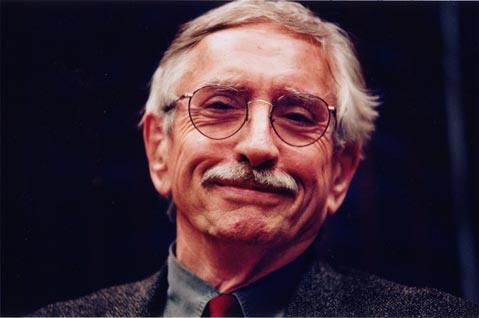Edward Albee to Speak at UCSB’s Campbell Hall
An interview with the Great American Playwright

Tonight at UCSB, Edward Albee will speak on the importance of theater as a catalyst for change. At 81, Albee certainly is the greatest living American playwright, and perhaps the greatest in the world. His extraordinary career began more than 50 years ago with The Zoo Story. His 1962 classic, Who’s Afraid of Virginia Woolf?, is enjoying a renaissance in Ventura, where an excellent contemporary production is running now at the Rubicon Theatre. I spoke with Albee recently on the phone from his home in lower Manhattan. He was terrific-and so witty that I almost wrote “terrifying.” What follows will give some idea of what awaits the audience at tonight’s talk.
Is it true that you won the Pulitzer Prize for Who’s Afraid of Virginia Woolf? but that it was taken away? Yes, that’s about it. The Pulitzer jury voted the play the best of the year, but the Columbia University trustees who administered the awards voted 8-7 not to give it. They felt that the play-what they knew of it-was too scary, or perhaps too intelligent. Fortunately, the New York Times contacted the trustees and conducted a poll, determining that of the eight negative votes, five were cast by people who had never seen or read the play. In that sense, they were objective. Of course, I never got as much mileage in terms of publicity out of any of the Pulitzers I received as I did out of the one they took away.
Have you ever been censored? The thing is, there are two kinds of censorship-from without, and from within. Censorship from without-whether by governments or by the market-is an attempt at thought control. But self-censorship can actually be much harder to confront and deal with. This is something I will be talking about at UCSB.
About Who’s Afraid of Virginia Woolf?: Are academics really as bad as all that? Do you mean are they as intelligent as that? Or do they stay up as late? Or drink as much as that? Sure. But it’s not like I’m somehow worried about it, or them. It’s just what they do.
Was alcohol an important part of American culture in the early 1960s? Did you partake? There was an awful lot of drinking going on then, yes. And I did drink, and I enjoyed it-some-but I stopped. In the end, it didn’t strike me as very helpful. Drinking too much, fighting, playing mind games, voting Republican-these are things we do to ourselves. But we don’t need to do these things, and they don’t serve us well.
Have you any favorite productions of Virginia Woolf? The original perhaps? The original cast, yes, they certainly were a favorite. Uta Hagen was really good as Martha. She took it all the way. And there have been productions that I’ve seen that I didn’t care for at all. But the original cast and then the 2005 cast, with Kathleen Turner and Bill Irwin, are my two favorites. Bill Irwin came close to the achievement of Arthur Hill, who originated the part of George and won a Tony for it. Bill was marvelous.
Is Virginia Woolf? an American tragedy? Define tragedy! I’m not even sure I know what it means anymore. There are elements of both comedy and tragedy in any worthwhile play. If by tragedy you mean is their marriage a tragedy, or is their situation tragic, I’d say “no.” I see the play as a love story. If George and Martha make sense of this life they are leading at all, then that’s enough, and it becomes something we can learn from.
Let’s use Aristotle as a starting point for defining tragedy-is the intent of the play to elicit catharsis? I don’t know about catharsis, but the intent is very much to offer a lesson, and to allow the audience to learn. I feel that at bottom, people come to the theater to be taught. There is an intuitive desire in humans to want to know new things, and this desire for knowledge is what the theater feeds, and what accounts for its universal appeal.
Can you give me an example of a play of yours and the lesson it contains? Take The Goat. It was expressly written to test the limits of tolerance. My intent was to make it clear that, for me, unless you give the goat a disease, or he’s not enjoying it, then, you know, what is the fucking problem? But it was difficult at first with that play-for people to come around to that view. “Don’t frighten the horses,” as the saying goes.
Are you a provocateur then? I hope so. I don’t set out to upset people, but I like ideas, and real ideas are provocative.
4•1•1
Edward Albee will speak at UCSB’s Campbell Hall on Thursday, February 12, at 8 p.m. For tickets and information, call 893-3535 or visit www.artsandlectures.ucsb.edu.



